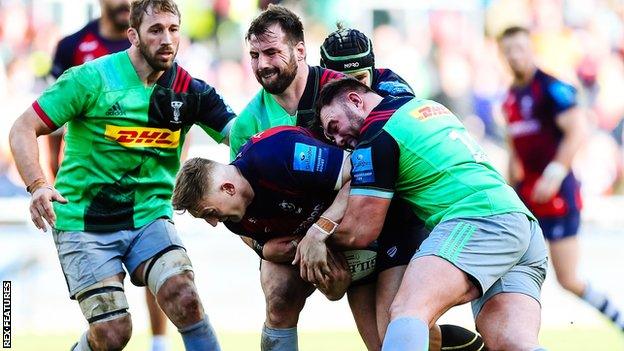Coronavirus: RFU boss Bill Sweeney says crisis will change rugby union
- Published

Bristol against Harlequins was the last Premiership match to be played on 8 March
The coronavirus crisis has shown the need for a radical overhaul of rugby union on a global scale, says RFU boss Bill Sweeney.
With unions and clubs thrown into financial turmoil, Sweeney believes the pandemic has highlighted the "fault lines" that exist in the game.
He says greater co-operation will lead to a more prosperous sport.
"I really do believe that coming out of this you will see a different structure and a different shape," Sweeney said.
Australia and the USA are among the rugby union nations plunged into crisis by the outbreak, while even the RFU in England - considered the richest rugby nation in the world - is braced for revenue losses of around £50m.
Sweeney says the grave impact of Covid-19 has forced unions to help each other like never before.
"What's coming out of this is another level of co-operation and collaboration that is going on," Sweeney told BBC Sport.
"Everyone knows where the issues and problems lie, but we haven't had a degree of co-operation and collaboration previously to be able to solve that. I think that is changing.
"We are talking to World Rugby and we are talking to the southern hemisphere almost daily at the moment, which is a good thing.
"We all want them to survive this, and they are slightly more exposed than us because they are at the very start of their season."
Streamlining rugby union's calendar, while balancing up the need for revenue generation as well as focusing on player welfare, has long been a conundrum facing the sport.
A summit in San Francisco in 2017 failed to suitably address the issues at hand, while World Rugby's revolutionary Nations Championship plans were scuppered last year.
But Sweeney is confident major changes are afoot as and when the various unions emerge from the current predicament.
"What this crisis has highlighted is the fault lines that exist in the global game," he explained.
"It would make no sense to come out of this and just carry on as before. We are looking at things now in terms of all bets are off, and a blank sheet of paper.
"How do we work together so we come out of this with a much stronger international game, a more rationalised calendar, that makes more sense to the fans and makes more sense to the commercial partners. How do we come out of it so everyone can benefit?
"Maybe that is optimistic, but I really do believe that coming out of this you will see a different structure and a different shape."